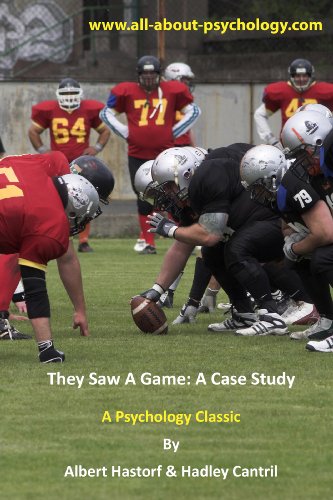They Saw A Game
A Case Study
Hadley Cantril; Albert Hastorf
BOOK REVIEW

In the realm of psychological studies and social perception, They Saw A Game: A Case Study stands as a riveting exploration of how our minds construct reality. By delving into the collective psyche surrounding a sports event, authors Hadley Cantril and Albert Hastorf masterfully unveil the intricate dance of memory, bias, and belief that shapes our individual experiences. This is no mere academic exercise; it is a compelling reminder of how our interpretations are influenced by social context and personal backgrounds.
Picture this: a bustling stadium, the air thick with anticipation as two rival teams clash on the field. As the match unfolds, every cheer, every gasp, reverberates through a crowd of passionate spectators, each with their own lens through which they view the unfolding drama. In their groundbreaking study, Cantril and Hastorf meticulously dissect the aftermath of a single game-the infamous 1951 Princeton vs. Dartmouth football match-revealing how drastically different perceptions can emerge from the same event. 🏈
The heart of this text pulsates with the idea that our interpretation of reality is far from objective. Readers are thrust into a world where nostalgia and emotion intertwine with the raw reality of sporting events. Cantril and Hastorf's findings reveal that the spectators, divided by team allegiance, interpreted the same incidents on the field in paradoxically divergent ways. This case study isn't just about football; it's about life-how our biases color our perceptions and how easily we fall prey to collective thinking. This duality invites you to reflect: how often do we find ourselves caught in this web of subjective experience, believing fervently in our truths while dismissing others?
Critics and supporters of this study alike agree on its monumental impact within social psychology. While some argue that the study's focus on a single game may oversimplify the vast complexity of human perception, others herald it as a landmark in establishing the foundations for understanding social beliefs and attitudes. The tension between subjective and objective judgment is a theme that reverberates through countless discussions in psychology today. 🌐
Readers are often struck by the implications of this study in our current era, marked by social media filters and echo chambers where individuals congregate around shared beliefs. Can you feel that stirring realization? The past unveils itself, reflecting the present in a hauntingly relevant manner. As debates rage on platforms driven by outrage and partisan divides, Cantril and Hastorf challenge you to question: Are we not, in many ways, still spectators in a grand game?
This case study also engages with the historical context of post-war America, a nation brimming with newfound confidence yet fraught with divisions-a perfect crucible for a study exploring how group identity shapes perception. As the authors weave in the cultural dynamics at play, they compel readers to unravel their biases and reflect on the collective narratives that bind us. The echoes of their findings remind us that even in our perceived reality, a smattering of empathy and understanding might just be the key to bridging the gaps that divide our communities.
Ultimately, They Saw A Game transcends mere data and analysis; it dares you to confront your own biases and engage in an empathetic exploration of differing perspectives. Will you emerge enlightened, or will you continue on, blind to the intricacies of human perception? This is your moment to dig deeper, for in this exploration lies not just academic knowledge but a pathway to profound self-understanding. So, join this intellectual journey and witness how a simple game can unravel the complexities of choice, belief, and the very fabric of our shared humanity. 🌍
📖 They Saw A Game: A Case Study
✍ by Hadley Cantril; Albert Hastorf
🧾 16 pages
2011
#they #game #case #study #hadley #cantril #HadleyCantril #albert #hastorf #AlbertHastorf